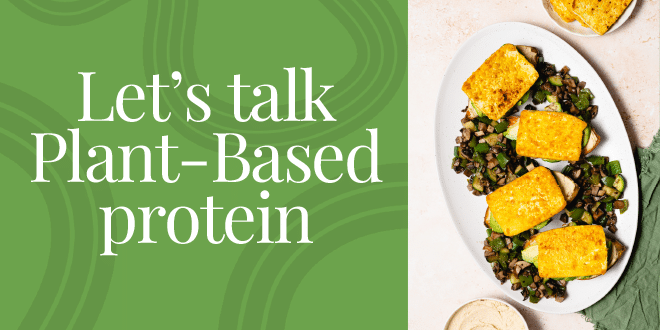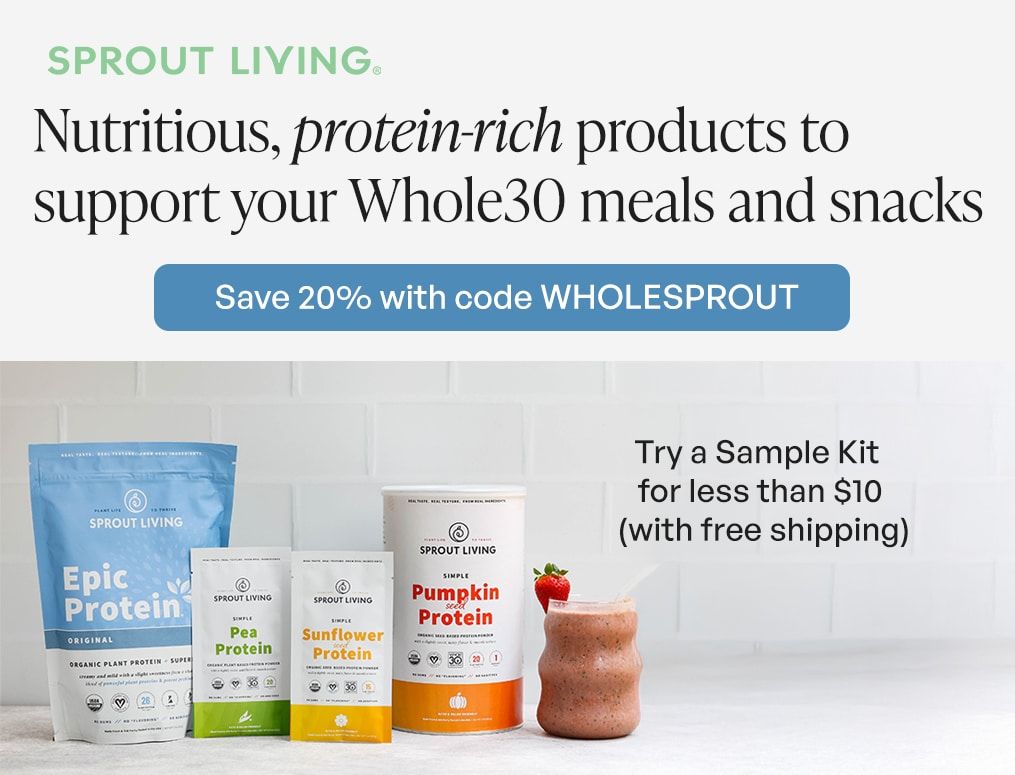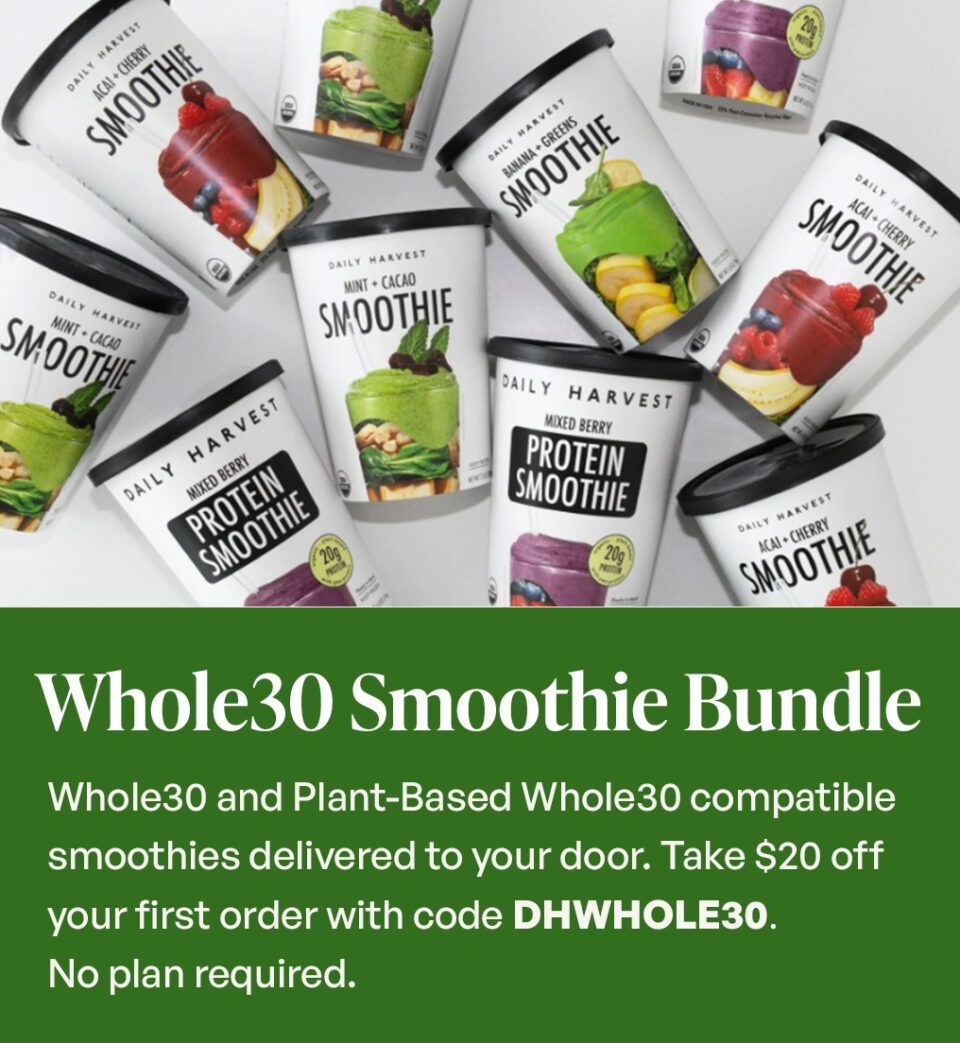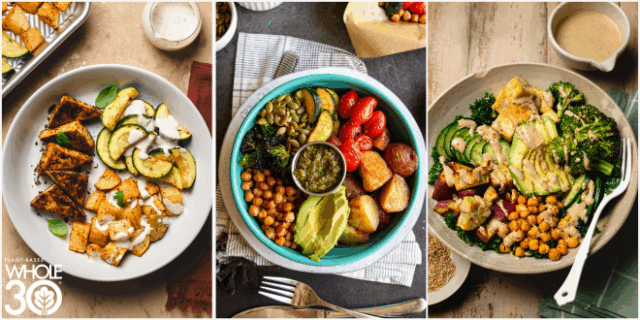Protein is so hot right now. It seems like everybody in the health-and-wellness world is talking about this essential macronutrient. Why is that? Registered Dietitian Rhyan Geiger and Mark Malinsky, the CEO and Founder of Sprout Living—makers of Whole30® Approved protein powder—have some ideas.
For Rhyan, it comes down to protein’s ties to muscle growth and the promotion of satiety. She says people want to build more muscle and enhance the feeling of fullness to help them avoid hunger-induced snacking. Since proteins are long chains of amino acids, they take longer to break down into absorbable pieces, Rhyan says. This longer process slows digestion, which helps you feel fuller longer.
As the CEO of a protein-powder producer, Mark has a unique perspective. When it comes to protein popularity, he points to the growing availability of different forms and sources of protein. There has also been an explosion of accessible information around protein and protein intake, raising awareness of the benefits and how much you should be eating. Also, Mark thinks the popularity of active lifestyles—and the support protein provides for adventurers—have boosted the nutrient’s profile.
Rhyan agrees that protein is a critical part of any diet, offering numerous benefits. Protein helps to build and repair cells, including muscle, hair, nails, and skin. It also works on a cellular level, helping to maintain fluid balance, conduct messages between hormones, and contribute to enzymatic reactions. Protein provides energy, helps your body to recover after exercise or activity, and promotes feelings of satiety. The protein in your meals can also help blunt the insulin response of simple carbohydrates, which promotes steadier energy and less blood sugar volatility.
We asked Rhyan and Mark to dive deeper into protein on the Plant-Based Whole30. Their answers will help you prepare for the program, add more plant-based protein to your diet, or enjoy your plant-forward food freedom.
Whole30: Is protein consumption more important on a Plant-Based Whole30? Why?
Rhyan Geiger (RG): Consuming adequate protein is essential for everyone, no matter your eating habits. For those who follow a plant-based diet, the recommended protein intake is slightly higher than for omnivores. I generally recommend clients start with 0.8g/kg for meat-eaters, and increase to 0.9 g/kg if you’re a plant-based eater. There is plenty of protein to be found in plants! As long as your diet is well-balanced and includes all nine essential amino acids (eaten throughout the day), protein can come in whatever forms you choose.
Mark Malinsky (MM): I have another consideration on the Plant-Based Whole30, especially for those coming from a typical American diet. During the elimination phase, you’re probably eating fewer carbohydrates from ultra-processed foods, breads, cereals, pasta, or rice. To keep cravings at bay and stay fuller longer, prioritize adding protein to your plate for every meal and snack.
Editor’s Note: At Whole30, we generally encourage adults to consume a minimum of 70 grams of protein a day during the program. We believe many would benefit significantly from more. A consultation with a dietitian is the best strategy for determining your individual protein needs.
Why is a lack of protein often associated with a plant-based diet?
RG: Many of us grow up believing that protein solely comes from meat. This leads to a bias in our perception of which foods provide protein or are suitable protein sources. However, numerous plant-based foods like tofu, tempeh, and lentils are rich in protein. Like any eating plan, eating plant-based requires careful planning to meet all nutrient targets.
MM: You can get all of the amino acids you need from plants, as long as you’re eating enough calories and a diverse range of plant foods. In fact, you can thrive on a plant-based diet! There are many vegan professional athletes—even Olympians—and people who have been on a plant-based diet for decades.
What makes for a “good” plant-based source of protein?
RG: The best plant-based proteins are those that you enjoy eating! The easiest and most dense sources of protein on the Plant-Based Whole30 are soy-based options like tofu, tempeh, and edamame. These choices contain the highest protein content per gram, as demonstrated on the Plant-Based Whole30 protein list. Other sources include beans, peas, lentils, and mycoproteins (derived from fungus). You can add extra protein to meals and snacks in the form of nuts, seeds (like chia and hemp), nutritional yeast, and spirulina. Consuming a diverse range of plant-based proteins throughout the day ensures adequate variety and enhances the likelihood of getting additional nutrients, such as zinc, vitamin C, iron, and fiber. For those who eat animal products, it’s also beneficial to incorporate plant-based proteins to boost these nutrients!
MM: When evaluating a plant-based protein source, the amino acid profile and general nutrient-density are important to review. Combining multiple plant protein sources would further boost the meal’s amino acid profile, and boost other benefits like vitamins, minerals, fiber, and healthy fats.
What role does protein powder play in a plant-based diet?
RG: Protein powders offer a quick and easy way to incorporate 20-30 grams of protein into your daily routine without needing to prepare an elaborate meal. Protein powders with simple ingredients and no added sugar are excellent for everyday use, and are a convenient tool to help meet your daily protein requirements.
MM: Most people don’t realize how versatile protein powder can be! People most often blend it with a plant-based milk, or incorporate it into a smoothie with a variety of fruits, veggies, and healthy fats. But you can also add protein powder to recipes (like soups, stews, chia puddings, or energy balls) to increase the protein content without disturbing the flavor.
What are your top tips for plant-based eaters concerned about eating enough protein?
RG: If you’re concerned about getting enough protein, assess your current protein intake to see where you stand. To increase the protein in your diet, choose more protein-rich sources (like soy), or add multiple sources of protein to each meal. Consider incorporating protein boosters into your plant-based meals and snacks to add an extra 5+ grams.
MM: One or two plant-based protein shakes or smoothies a day adds a notable amount to your daily goal. Adding nuts, seeds, or other protein boosters to your smoothies is another easy way to further boost your protein (and nutrients).
For those who are new, what makes a protein powder Whole30 Approved?
MM: On the Whole30, there are strict guidelines on the ingredients you eliminate during the first 30 days. Unfortunately, most protein powders contain sweeteners, soy, dairy, or other ingredients that aren’t compatible with the program. It’s hard to find unsweetened protein powder in general! Sprout Living has a line of Whole30 Approved protein powders that meet the program guidelines, and can easily support your protein goals.
Want more articles like this delivered to your inbox? Sign up for Plant-Based Whole30 emails to get articles, recipes, tips, and more sent to you every week.

















